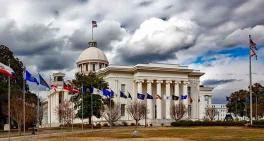N Carolina elections board back in court in power struggle
National Legal News
The repeatedly altered composition of North Carolina's elections board returned to court Thursday as a proxy for the lengthy power struggle between Democratic Gov. Roy Cooper and the Republican-dominated legislature.
A panel of three trial judges listened for over three hours but didn't immediately rule on the request by Cooper's lawyers to throw out a third iteration of a combined elections and ethics board. Structures of two earlier versions created by GOP lawmakers previously have been declared unconstitutional.
GOP lawmakers and Cooper have been embroiled in litigation and political disputes since Cooper was elected governor in 2016. Lawmakers have passed several bills that eroded Cooper's powers. The board is important because its members can approve early-voting sites that could affect election turnout. They can also assess campaign finance penalties and determine ethics law violations.
Republicans argue their latest attempt — the current nine-member board chosen by Cooper, with four Democrats, four Republicans and a ninth who can't be a member of either party — passes constitutional muster.
But Jim Phillips, a Cooper lawyer, told the judges the new board structure suffers the same flaws as the other versions because it still usurps the governor's constitutional duty to ensure state election laws are faithfully executed. While Cooper appoints the entire board, Phillips said, he only has strong influence over the four Democratic choices, picked from a list provided by the state Democratic Party.
Related listings
-
Philadelphia's tax on soda upheld by state Supreme Court
National Legal News 07/18/2018Pennsylvania's highest court is upholding Philadelphia's tax on soda and other sweetened drinks, rejecting a challenge by merchants and the beverage industry.The Supreme Court ruled Wednesday the 1.5-cent-per-ounce levy is aimed at distributors and d...
-
Police shooting of boy spurs more protests, appeals
National Legal News 06/22/2018Protesters demonstrated Friday for a third day over the fatal police shooting in Pennsylvania of an unarmed black teen fleeing a traffic stop as they sought to get the attention of a nation engrossed by the immigration debate, and to pressure officia...
-
Gamers in court for first time after Kansas 'swatting' death
National Legal News 06/16/2018Two online gamers whose alleged dispute over a $1.50 Call of Duty WWII video game bet ultimately led police to fatally shoot a Kansas man not involved in the argument will make their first appearances in court Wednesday in a case of "swatting" that h...

Our Eugene Oregon Bankruptcy Practice
Since 2005, Erin Uhlemann has helped individuals and families facing financial difficulties file for bankruptcy relief. Erin's compassion and understanding of the law have helped hundreds of Oregonians achieve a financial fresh start. She started Willamette Valley Bankruptcy to focus on helping clients with bankruptcy and debt issues in the Lane County Area. Erin understands that choosing a bankruptcy attorney who makes you feel comfortable and confident can be as difficult as deciding whether to file a bankruptcy case. Because she knows that filing bankruptcy is not something that you planned to do or look forward to doing, Erin strives to make the process as easy as possible.
Because most people facing bankruptcy do not have extra money to pay fees, Willamette Valley Bankruptcy offers low upfront fees and will work with you to set up affordable payment plans to pay attorney fees and court filing fees. Consultations are always free so that you can get the answers you need before making any sort of financial commitment. If you have questions about attorney fees and payment plans, you can call or email today to get these questions answered.




